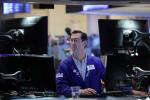When everything is said and done, more is often said than done. However, this time is different. Leaving aside the response to the public health emergency, G-10 governments and central banks have responded relatively quickly and boldly. The 2008-2009 playbook was a starting point, but new features have emerged, including cash payments directly to households, tax deferments, and more countries seemed prepared to have the government absorb some of the labor costs without requiring lay-offs, as Germany has done for years. Small and medium-sized businesses are also receiving more official support than past crises. Several countries, including the U.S., Germany, and the UK are preparing to take equity stakes in large businesses that require assistance.
The markets have recently appeared to take cues from the ebb and flow of progress toward a substantial fiscal response by the U.S. Now that it is in hand, an important question is what will be the next focus. Of course, a wary eye is watching the curves of contagion and concerned about possible setbacks in countries where the curves had seemed to turn. Given the magnitude of the economic contraction that is coming, the 30-38% slide of the equity benchmarks (from the high earlier this year to last week's trough) seems broadly rationale.
Now that the G7 has gone to war-footing, which means previous practical and ideological limits are overcome, the panic among investors has calmed. The extent of official response and the ability to scale many of the programs may be encouraging asset managers as portfolios are adjusted at the end of month and quarter. After practically goading officials into action, it is as if the markets now validate the extent of the response, and are going with official desires instead of fighting them. To the extent that a rising dollar tightens global liquidity, the implication of the crisis response is for a . The ECB has made it clear that the inter-governmental bond spreads are indeed part of its transmission mechanism. Its actions have once again countered revaluation risk (a country leaves the monetary union), and investors will think twice about re-visiting those extremes.
The dollar unwound a good part of its recent gains last week. The Dollar Index fell by 4.4% last week, offsetting in full the previous week's gain, and retracing more than half of the dramatic gains that had lifted it from the year and a half low on March 9 (~94.65) to the three-year high on March 20 (~103). It is not clear the role of the Fed swaps with foreign central banks played in the dollar's sharp sell-off last week.
Consider the , which snapped a four-week slide with a 2.65% gain, despite an unexpected 50 basis point at the end of the week. There was no take-up of dollar swaps, and the three-month cross-currency swap was virtually unchanged last week. The dollar's weakness also coincided with large rallies in equity markets, even if gains were pared in the U.S. and Europe ahead of the weekend. Bond yields also fell in most G10 countries and premiums over German bunds in Europe narrowed.
Next week, the debate in the U.S. about whether the shutdown in the U.S. should end or be lengthened will intensify. The shutdown decisions were made by state and local officials, not Washington DC. It may take more than assurances from politicians and statistical references to the slowing of the rate of the rate of change to make people feel safe again. Ubiquitous testing with quick, reliable results are important, and only then will people, businesses, investors, and the government have the information to discount different scenarios with confidence.
Crisis tests our fortitude, and it tests our leaders. It is also an opportunity for other leaders to emerge, like the unemployed electrician in shipyards of Gdansk, who jumped a fence and helped launch Solidarity, which arguably did more to end the generation-long Cold War than the hundreds of billions of dollars spent on armaments. In the U.S., notably, two officials, ironically on different sides of the issues, have seen their approval rating rise, President Trump and New York Governor Cuomo. On their third attempt and fourth attempts, the UK Prime Minister Johnson and Chancellor of the Exchequer Sunak struck the right note. They went big and bold in ways that even Labour may applaud, like absorbing some (80%) of wages costs for those impacted by Covid-19 and expanding welfare support. Leaving aside the particulars, it does seem reasonable to expect a common response is to support leaders in the middle of a crisis.
The major industrialized countries have not provided much global leadership. Last week, the G7 failed to issue a statement, even one with platitudes about the shared commitment to do whatever it takes. According to a German account, the problem stemmed from opposition to the U.S. insistence that Covid-19 was called the Wuhan Flu. The World Health Organization does not name viruses after a city or country because of the stigma (yes, it is not clear where the Spanish Flu began, but experts seem to think it most likely was not Spain).
That at least some U.S. officials are moving to try to frame the issue before it has been resolved ought not to be surprising. Clearly, China and Russia are trying to do the same thing by selling medical supplies to European countries in ways one must be suspicious of as trying to sow seeds of discord and false information. Germany and France were criticized earlier this month. Still, they have stepped up, sharing masks and protective suits to Italy, for example, and have shared in hospital capacity for patients from both Italy and France. On the other side of the crisis, re-onshoring medical goods capacity seems to be a likely and obvious response for the U.S. and Europe.
Germany also rose to the occasion in terms of fiscal policy. The public health crisis and the economic emergency has overcome inhibitions about deficit spending. It also supports the relaxation of the EU's fiscal rules for others. Those that supported a joint bond issuance during the sovereign debt crisis a decade ago, again, are advocating it now. Those that were opposed, especially, but not limited to Germany and the Netherlands, have not been swayed. The high debt burdens of the deficit countries to begin with, and insufficient structural reform continues to discourage the creditors from agreeing to take on such financial responsibilities implied by joint debt.
Speculation earlier this quarter that the major central banks had exhausted their tool kit seems quaint now. The Federal Reserve and European Central Bank have both taken some unprecedented measures. The Fed included local government debt for the first time, and a facility to support corporate debt and will have a program shortly to help small and medium-sized businesses. It extended temporary swap lines with several central banks and offer those with permanent facilities a daily auction of seven-day swaps. Although financial institutions in other countries are struggling to secure dollar funding, the limited extension of the swap line to countries that the U.S. deems important could be a missed opportunity to underscore the dollar's role as an international public good, a utility, if you will. The more the dollar is seen weaponized, the greater the desire for an alternative.
The ECB's Pandemic Emergency Purchase Progam is bold. It will have the capacity to buy up to 750 bln s. While it was announced on March 18, it was not until a week later than the legal documents made it clear innovation. In the past bond-buying programs, the ECB was directed by the capital key (which roughly corresponds to a country's GDP weighting) and an issuer cap of 33%. The new program eschews such self-imposed limits, and explicitly abandoned the issuer limit, and expanded the instruments to include instruments maturing in as little as 70 days (previously one-year was the shortest). Note that at least initially, Germany has indicated it would finance its new borrowings in the bill market. The ECB has nearly full discretion and it makes this policy lever more powerful.
There is no doubt that economic data in the coming months will be dreadful. The markets do not seem particularly sensitive to the high-frequency data. This was the message from the reaction to the flash PMIs (sank) and U.S. weekly (3.28 mln, record). It is the closest thing to a real-time read on the world's largest economy. Another rise of more than three million is expected. Consider the hospitality sector, broadly understood to include hotels, air and ground travel, restaurants and bars, sporting events, public performances, etc., employ 10% of the U.S. workforce. Construction and auto production has shut. St. Louis Fed President Bullard estimated that 30% of American workers have jobs requiring person-to-person contact. Continuing claims will draw attention as the spiking higher too. A Reuters/IPSOS polls found nearly one-in-four in the U.S. has said they have been either furloughed or laid off due to the coronavirus.
Because of the when the survey is conducted for the monthly rolls may not capture the magnitude of the disruption. The Bloomberg survey found a median forecast of a loss fo 100k jobs while the Dow Jones survey found a median forecast of a 56k loss. In either case, it will provide to be a small drop in the bucket of the wave of lay-offs that have begun. March may draw some attention (Bloomberg consensus is for 13.75 mln seasonally-adjusted annual rate vs. 16.83 mln in February), and obvious risk is on the downside. In 2009, auto sales bottomed near 9.0 mln. The dramatic U.S. economic contraction underway and the disruption to trade will likely translate into an improvement in the U.S. balance in the first half. The February figures (April 2) may be too early to see the impact.
While the flash PMI reports will be finalized, there has been little data about prices. The eurozone will change this with its preliminary March report on March 30. A pandemic is a powerful deflationary force on the region that had a 1.2% and headline rate of CPI in February. The strategic goal is to preserve aggregate demand and maintain the circuit of capital (markets and banks). There are bound to be some distortions, inflation is understood to be an increase in the general price level, not relative prices. Still, the concern about the inflationary implications of the aggregate demand support before output increases may be indicative that a nadir has passed.
Japan's February data is likely to begin reflecting the very early days of the crisis as China's New Year holiday was extended. The recovery of the world's third-largest economy from the tax hike and tsunami last October has been cut short and this will be evident in the weakness in February r and . The is will likely deteriorate markedly. Because of how supplier-deliveries are used, the flash reading may have held up better than what is really the case. The Tankan Survey may show more convergence.
Among the most interesting reports will be China. The general sense from anecdotes, traffic reports, and air pollution readings, and the like, is that the Chinese economy is still falling, albeit it is doing so at a slower pace. It appears to be a point of pride for Chinese leadership that the country emerges first from the crisis. If this is a global reset of sorts, China wants to have a strong position. Yet there seems to be little appreciation for the deep level of mistrust of the data of any kind. Indeed, this credibility gap has only widened during the pandemic. This may be one of the biggest obstacles for China to overcome.











Add a Comment
We encourage you to use comments to engage with other users, share your perspective and ask questions of authors and each other. However, in order to maintain the high level of discourse we’ve all come to value and expect, please keep the following criteria in mind:
Enrich the conversation, don’t trash it.
Stay focused and on track. Only post material that’s relevant to the topic being discussed.
Be respectful. Even negative opinions can be framed positively and diplomatically. Avoid profanity, slander or personal attacks directed at an author or another user. Racism, sexism and other forms of discrimination will not be tolerated.
Perpetrators of spam or abuse will be deleted from the site and prohibited from future registration at Investing.com’s discretion.